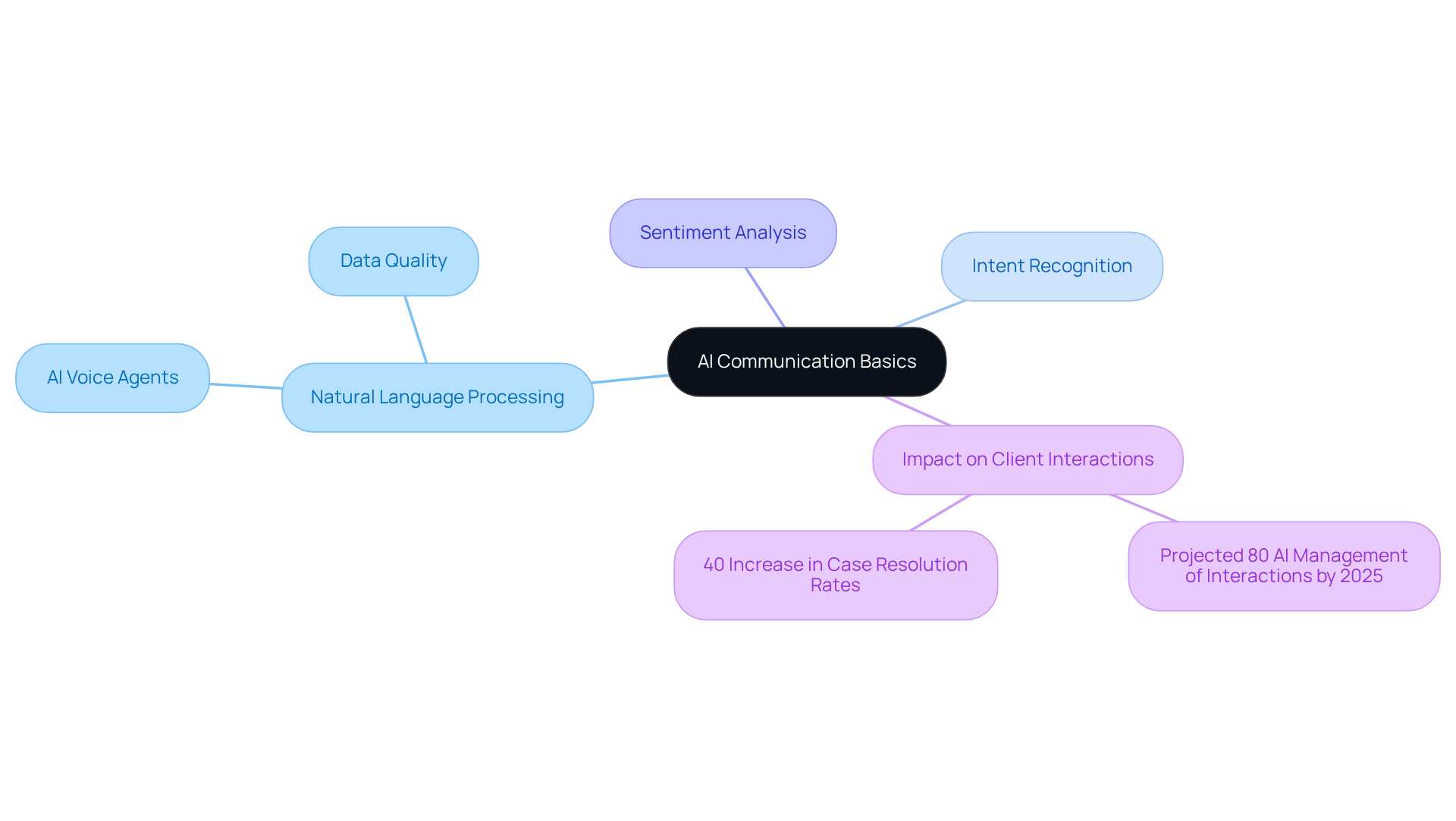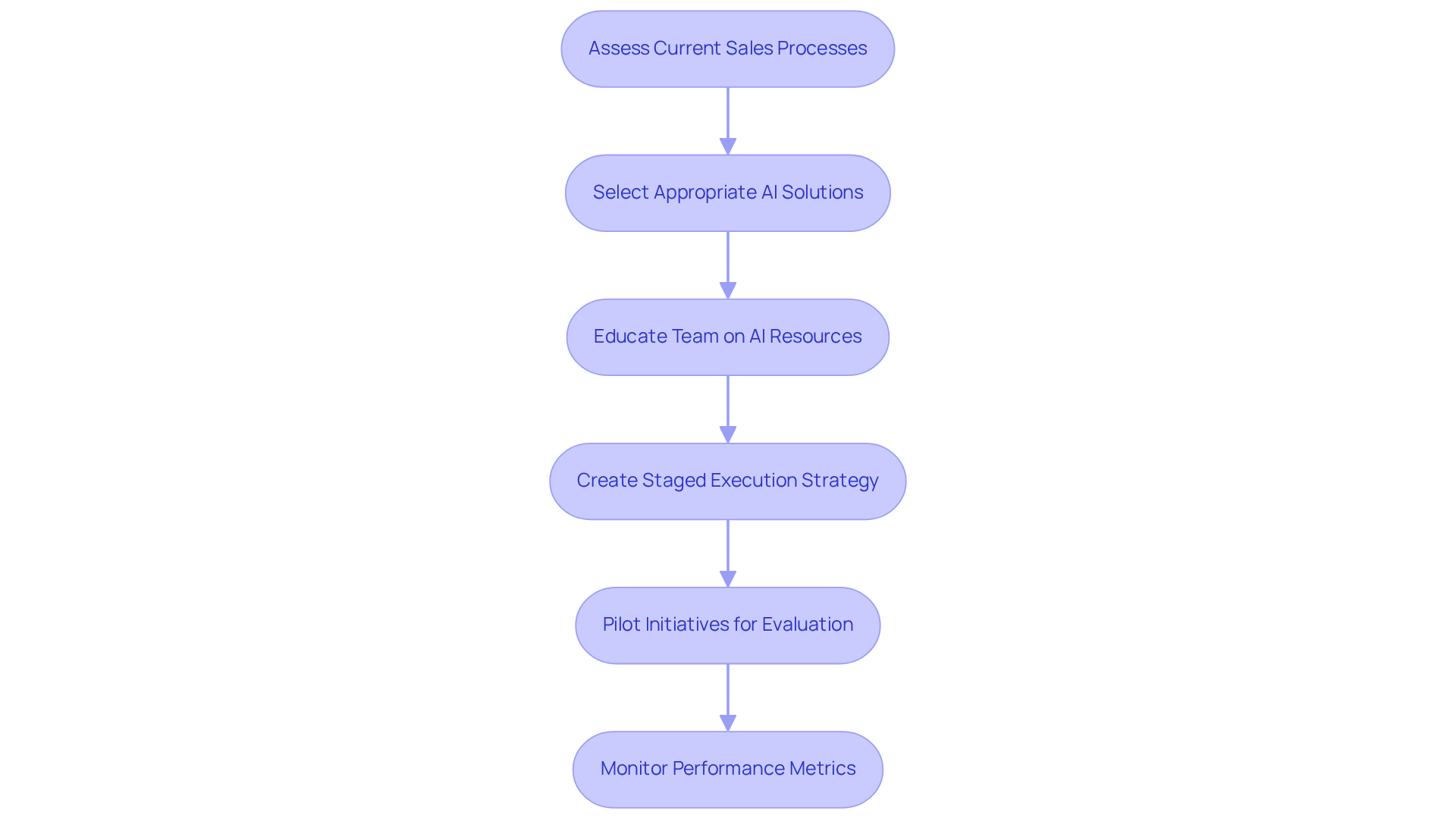Overview
The article emphasizes the significance of mastering AI communication, particularly through tools such as Natural Language Processing (NLP) and AI voice agents, in enhancing sales success. It highlights the critical role of data quality and the effective integration of AI technologies within sales processes. These elements have been demonstrated to significantly elevate client interactions and improve revenue outcomes, establishing a compelling case for the adoption of AI in the sales domain.
Introduction
The landscape of sales is experiencing a seismic shift as businesses increasingly adopt artificial intelligence to enhance communication and drive success. For sales professionals aiming to leverage these technologies effectively, understanding the fundamentals of AI communication—particularly natural language processing—is essential.
However, as organizations embrace AI voice agents and tools, they encounter critical challenges related to data quality and team adoption.
What strategies can be implemented to overcome these obstacles and fully harness the power of AI in sales?
Understand AI Communication Basics
Harnessing the power of AI in sales necessitates a solid grasp of AI communication fundamentals. At the core of this is natural language processing (NLP), which empowers AI to comprehend and generate human-like responses, thereby enhancing interactions between businesses and clients. Key concepts such as intent recognition and sentiment analysis are vital for tailoring AI responses to effectively meet client needs. By 2025, the impact of NLP on client interactions is projected to be significant, with AI anticipated to autonomously manage 80% of all client interactions, greatly improving engagement and satisfaction rates.
Intone's AI voice agents exemplify this transformation, offering features that bolster sales efficiency through real-time feedback and high-volume dialing strategies tailored to specific objectives. These agents analyze customer data to develop detailed prospect profiles, facilitating that resonate with potential clients. Companies leveraging Intone's NLP-driven AI tools, particularly in sectors like finance and e-commerce, have reported over a 40% increase in case resolution rates, highlighting the tangible benefits of these technologies.
Moreover, the quality of information provided to AI systems is paramount; it directly influences the efficiency of AI communication. Organizations often face challenges regarding information reliability, such as ensuring it is clean, relevant, and representative of their target audience. As organizations increasingly embrace AI solutions like Intone's, understanding and applying these principles will be crucial for achieving revenue success. As industry experts assert, "The effectiveness of AI communication heavily relies on the data it processes," emphasizing the critical role of data quality in maximizing the potential of AI tools.

Leverage AI Voice Agents for Sales Optimization
AI voice agents are revolutionizing business processes by automating routine tasks and enhancing client interactions. To harness their full potential, it is crucial to identify key areas within your revenue funnel for integration, such as:
- Lead qualification
- Follow-ups
- Client support
For instance, Intone's human-like AI voice agents can adeptly manage initial client inquiries, allowing human agents to focus on more complex issues. Implementing a system where these agents evaluate leads based on established criteria, including engagement levels and purchase intent, ensures a more streamlined selling process.
Equipping your AI voice agents with real-time analytics capabilities is vital for monitoring performance and user interactions. Intone's analytics dashboard provides immediate insights into performance, facilitating rapid adjustments to marketing strategies that can enhance conversion rates. Regular updates to the AI's training data are essential to adapt to shifting customer preferences and market dynamics, ensuring that your voice agents remain effective and relevant.
Research indicates that organizations experience significantly higher growth than those that do not. For example, 83% of revenue teams utilizing AI reported an increase in earnings, underscoring the importance of integrating Intone's AI voice agents into your revenue strategy. By embracing these technologies, businesses can improve lead qualification, streamline follow-ups, and ultimately drive revenue success, as evidenced by GCS's effective scaling of sales efficiency through Intone's customizable AI voice agents.

Implement AI Tools in Your Sales Strategy
To effectively incorporate into your sales strategy, begin by assessing your current sales processes to identify areas requiring improvement. By focusing on specific needs, you can choose AI solutions that align with your objectives, particularly CRM systems that feature AI functionalities for lead scoring and customer insights. Educating your team on these resources is essential for enhancing their potential and ensuring they are equipped to leverage these tools effectively.
Next, create a staged execution strategy that enables gradual incorporation, starting with pilot initiatives to evaluate the resources in practical scenarios. This approach not only mitigates risks but also allows for adjustments based on real-world performance. Closely monitor their performance using key metrics such as conversion rates and customer satisfaction scores to gauge their effectiveness. Be prepared to refine your approach based on feedback and performance data, ensuring that your AI resources evolve alongside your sales methods.
Statistics reveal that companies utilizing CRM systems can anticipate an average return of $8.71 for each dollar invested, underscoring the significant impact these tools can have on revenue performance. This compelling data emphasizes the importance of integrating AI into your sales strategy, setting the stage for sustained growth and success.

Troubleshoot Common AI Implementation Issues
Integrating AI in sales frequently poses various obstacles, with information quality being a key issue. Precise and current information is essential to avoid skewed results; therefore, conducting regular audits of your information sources and rectifying inconsistencies is crucial. Research shows that 85% of AI projects fail because of inadequate information quality, emphasizing the necessity for careful information management. As noted by MIT Sloan, "85% of AI projects fail because of poor data quality."
Resistance to change among team members can also hinder AI adoption. To address this, provide comprehensive training and showcase the benefits of AI tools through compelling case studies. Studies indicate that 33% of operations experts claim inadequate employee training hinders AI adoption, highlighting the significance of efficient training initiatives. Organizations that invest in training experience enhanced revenue performance and quicker deal closures.
Integration with existing systems poses another challenge. Work closely with your IT department to ensure between AI tools and your existing platforms. A considerable 28% of sales experts mention challenges in incorporating AI into their workflows, highlighting the necessity of a well-structured integration strategy. Notably, 40% of sales organizations are currently testing AI, which highlights the relevance of addressing integration issues.
In case of technical issues, maintain open communication with your AI tool provider for support and troubleshooting resources. As highlighted, "To unlock its full potential, GTM teams must tackle challenges related to information quality, training, and integration." Ongoing input from your sales group is essential; it assists in recognizing areas for enhancement and enables you to adjust your AI strategy efficiently. Additionally, it's important to recognize that 76% of consumers fear receiving incorrect information from AI tools, which underscores the necessity of ensuring data quality and building trust in AI implementations. By addressing these common challenges, you can enhance the effectiveness of your AI implementation and drive better sales outcomes.
![]()
Conclusion
Mastering AI communication is not merely advantageous; it is essential for driving sales success in an increasingly competitive landscape. By grasping the fundamentals of AI, particularly natural language processing, businesses can significantly enhance their interactions with clients, leading to improved engagement and satisfaction. The integration of AI voice agents streamlines processes, facilitating efficient lead qualification and follow-ups, ultimately optimizing revenue strategies.
This article underscores several key insights, including:
- The paramount importance of data quality in AI communication
- The transformative role of AI voice agents
- The necessity of a structured implementation strategy
Organizations that leverage AI tools, such as Intone's voice agents, have reported substantial improvements in case resolution rates and overall sales performance. By proactively addressing common challenges, such as information quality and team resistance, companies can harness the full potential of AI to drive growth.
Embracing AI in sales transcends being a mere trend; it stands as a strategic imperative for sustained success. As the landscape evolves, businesses must prioritize the integration of AI tools and invest in training their teams to adapt effectively. By doing so, organizations can ensure they remain at the forefront of innovation, ultimately enhancing their competitive edge in the market.
Frequently Asked Questions
What is the significance of AI communication in sales?
AI communication is essential in sales as it enhances interactions between businesses and clients through natural language processing (NLP), enabling AI to understand and generate human-like responses.
What are key concepts in AI communication?
Key concepts include intent recognition and sentiment analysis, which help tailor AI responses to effectively meet client needs.
What is the projected impact of NLP on client interactions by 2025?
By 2025, NLP is expected to enable AI to autonomously manage 80% of all client interactions, significantly improving engagement and satisfaction rates.
How do Intone's AI voice agents improve sales efficiency?
Intone's AI voice agents provide real-time feedback and high-volume dialing strategies, analyze customer data to create detailed prospect profiles, and facilitate personalized communication strategies.
What benefits have companies seen from using Intone's NLP-driven AI tools?
Companies, particularly in finance and e-commerce, have reported over a 40% increase in case resolution rates when leveraging Intone's NLP-driven AI tools.
Why is the quality of information important for AI systems?
The quality of information directly influences the efficiency of AI communication, as unreliable data can hinder the effectiveness of AI tools.
What challenges do organizations face regarding information reliability for AI?
Organizations often struggle to ensure that the information provided to AI systems is clean, relevant, and representative of their target audience.
What is crucial for achieving revenue success with AI solutions?
Understanding and applying principles of AI communication, particularly regarding data quality, is crucial for organizations to achieve revenue success with AI solutions.






